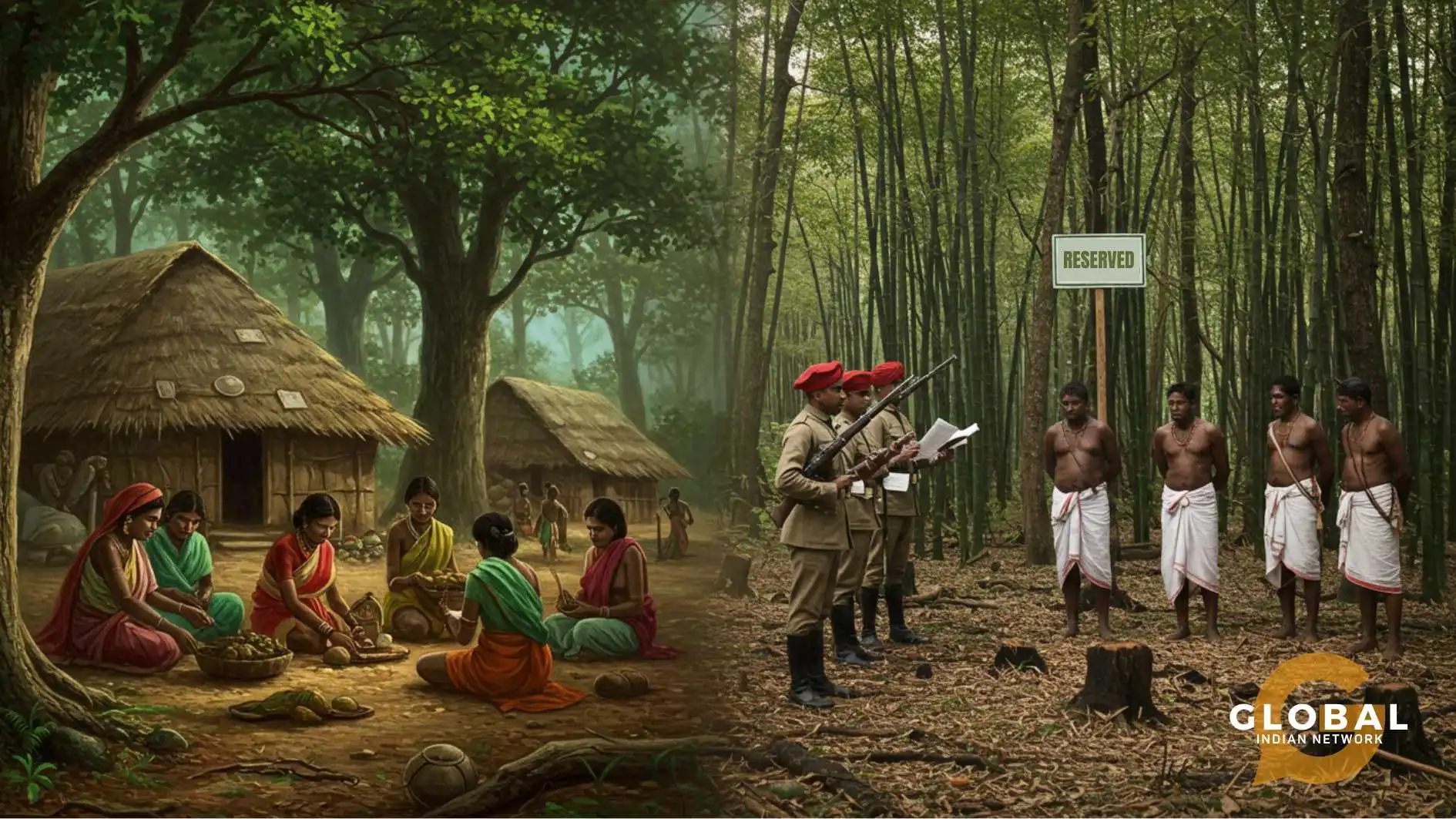When we discuss how did colonial rule affect tribal lives or tribal communities, it is evident that tribals have a very close relationship with the land and forests. Before the colonial powers even came, tribal communities lived very closely with nature and had a very symbiotic relationship with their natural surroundings. They often possessed communal land tenure systems and relied on forests for sustenance, livelihood and cultural practices. The practice of colonial imposition in administration, economic exploitation, and resource control systematically disrupted these traditional structures, which led to widespread displacement, cultural disruptions and economic hardship.
Table of Contents
How Did Colonial Rule Affect Tribal Lives?
The imposition of colonial powers in many parts of the world, as well as in India, was a turning point for indigenous communities. For years or centuries, tribal communities or societies thrived on their close connection with nature, especially forests, which not only provided resources for daily activities but also spiritual and cultural anchors. Their lives were deeply woven with the forest’s ecosystem, helping them with shifting cultivation, hunting, gathering and collecting forest resources.
Land was viewed as a resource everyone could use as a community and not a private commodity. The colonial agenda focused on maximising revenue and exploiting natural resources for their very industrial needs, which clashed with their traditional way of living, leading to a horrible and devastating consequence for Tribal populations and their ancestral domains.
Leaving the economic and physical displacement, colonial rule also affected and damaged the social and cultural fabric of tribal societies. The imposition of external administration and the cornering of the authority of tribal chiefs and traditional governance systems, removing them from the centralised colonial bureaucracy, all suppressed the communities.
Tribal leaders who were once powerful and responsible for their communities were now just mere intermediaries forced to follow colonial laws and collect taxes.

Depletion of Land Rights and Traditional Livelihoods
One of the most significant impacts of colonial rule was the imposition of systematic erosion of tribal land rights. The colonial administration, desiring to control revenue, introduced new land tenure systems that sometimes did not recognise communal ownership.
They declared forests as state property, taking away the lands of tribal communities that they occupied and managed for centuries. The shift from communal to private state ownership severely damaged the tribal communities, leading to displacement.
To support these statements, we can take the example of the British in India, who introduced many Land revenue policies, such as the Zamindari and Ryotwari systems, which often disregarded the traditional land-holding systems of tribal communities. Land previously managed by these tribal communities was now given to individual landowners or declared state property, leading to the alienation of tribal land to outsiders, especially moneylenders and landlords.
Tribal people who were unfamiliar with these new systems and the new legal frameworks, lacking formal documentation for their land, led them to get pushed into a life of debt and landlessness. The displacement forced them to go outside their communities and seek a livelihood as wage labourers, which was often under exploitative conditions in mines, plantations and construction projects.
Shifting cultivation (Jhum), which was a sustainable practice for many tribal communities, was often banned, which further undermined their traditional food security and forced them into settled agriculture, which did not suit them or their environment and knowledge about cultivation.
Imposition of Forest Laws and Commercialisation
Colonial forest laws were one of the most direct and impactful assaults on tribal livelihood and their connection with forests. The increasing demand for timber for railway expansion, shipbuilding and other colonial industries led to the taking away of large forest lands as ‘Reserved’ or ‘Protected’ forests. These classifications of lands drastically restricted or banned traditional tribal activities, such as hunting, gathering of forest resources, grazing and shifting cultivation.
The Indian Forest Acts of 1865 and 1878 criminalised many old-age tribal practices, turning them into poachers or encroachers on their generational land. These laws were seen as aiming to conserve forests from the colonial perspective.
The monopolisation deprived the communities of their sources of sustenance and income. Tribal villages were allowed to remain within the Reserved forests, but only if they provided free labour for the forest department activities like tree felling and transportation.
These activities created forced labour and exploited tribal communities, pushing them deeper towards poverty and dependence. The commercialisation of forests opened opportunities for exploitation by traders and moneylenders who, with colonial backing, cheated tribal in exchange for forest products.

Conclusion
Colonial rule permanently changed tribal lives and their connection with land and forests. The forcing of new land tenure systems, restrictive forest laws, and outside administrative structures banned tribal communities from their land. Their traditional livelihood was dismantled, their cultural identity eroded. The mass extraction from the forests for resources affected tribal income, leading to widespread poverty, exploitation and social fragmentation.
How did colonial rule affect tribal lives? It’s not just a mere question to understand this; there is a huge history that we have to go back to to understand how colonial rule stripped the identity of the tribal people permanently and created generational trauma and insecurity among the tribals. Tribal communities often resisted this exploitation through various uprisings and movements. The legacy of being continuously marginalised and vulnerable is still felt by these indigenous people to this day. Understanding this historical injustice or exploitation is crucial for addressing the ongoing challenges faced by tribal communities in maintaining their rights and preserving their unique heritage.
FAQs
What were the effects of colonial rule on tribes?
The arrival of colonial powers, especially the British, brought significant changes to the social, economic, and cultural fabric of these tribal societies. This impact was often marked by the displacement of tribal populations, land alienation, exploitation, and the erosion of traditional ways of life.
How were the lives of the people under colonial rule?
Under colonial rule, the lives of pastoralists changed dramatically. Their grazing grounds shrank, their movements were regulated, and they had to pay more revenue. Their agricultural stock declined, and their trade and crafts were adversely affected.
How did colonialism affect the Adivasis?
Colonial revenue and agriculture policies had brought heavy pressure on land, both in the plains and the hills. This evicted the Adivasis from their land. The Adivasis were relinquishing their lands in protest against colonial revenue and agricultural policies.









